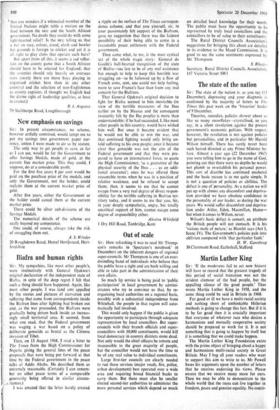Biafra and human rights
Sir: My sympathies, like most other people's, were instinctively with General Ojukwu's original declaration of the independent state of Biafra, in spite of the deep regret I felt that such a thing should have happened. Again, like most other people, I was (and am) appalled by the stories and pictures of starvation and suffering that came from correspondents inside the Biafran lines after fighting had broken out and, as the war proceeded, the Biafrans were gradually being driven back inside an increas- ingly small territorial area. It seemed, from what one read, that the Federal government was waging a war based on a policy of deliberate genocide as brutal as the Chinese invasion of Tibet.
Then, on 13 August 1968, I read a letter to The Times from the High Commissioner for Nigeria giving the general lines of the peace proposals that were being put forward at that time by the Federal government in the peace talks at Addis Ababa. He described them as extremely reasonable. (Certainly I can remem- ber no other peace terms of a comparable generosity being offered in similar circum- A-stances.)
I was amazed that the letter hardly created
a ripple on the surface of The Times correspon- dence column, and that you yourself, sir, in your passionately felt support of the Biafrans, gave no suggestion that there was the faintest possibility of their being able to come to a reasonable peace settlement with the Federal government.
Then came what, to me, is the most cynical act of the whole tragic story : General de Gaulle's half-hearted recognition of the state of Biafra—too late to be of any real assistance but enough to help to keep this horrible war straggling on—to be followed up by a flow of French arms, sent, one could not help feeling, more to save France's face than from any real concern for the Biafrans.
That General Ojukwu's original decision to fight for Biafra seemed to him inevitable. (in view of the terrible massacres of the Ibos earlier on by the Hausas and the consequent insecurity felt by the Ibo people) is more than understandable; if he had succeeded, I, like most other people in this country, would have wished him well. But once it became evident that he would not be able to win the war, and that continued fighting would only bring un- told suffering to his own people; once it became clear that genocide was not the aim of the Federal governthent and that they were pre- pared to have an international force, to quote the High Commissioner, 'as a guarantee of the physical security of the Ibos . . . as an addi- tional assurance'; once he was offered these reasonable terms when he was in a position of relative weakness, and he refused to accept them; then, it seems to me that he cannot escape from a very real degree of direct respon- sibility for the terrible suffering in Biafran ter- ritory today, and it seems to me that you, Sir, in your deeply sympathetic, angry, but totally uncritical support of him, cannot escape some degree of responsibility either.


































 Previous page
Previous page